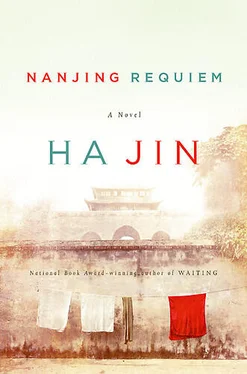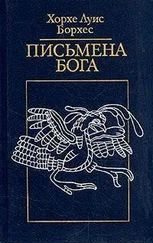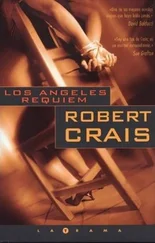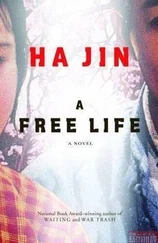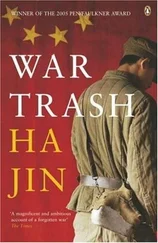When we returned half an hour later, we found Big Liu smoking in the hallway. He told us, “Someone from the Quaker Mission came and said there was a mad girl in their hospital. He said she was from our college.”
“What’s her name?” asked Minnie.
“No idea.”
“What should we do?” she asked me.
“Maybe we should go have a look,” I said.
“All right, let’s go.”
The two of us hailed a rickshaw and set out for the small hospital in the south, outside the former Safety Zone, which had been terminated a fortnight before. As we rode along Paolou Lane, four Chinese planes suddenly appeared, flying east to bomb the airfield near Jurong. Immediately antiaircraft guns started shooting at them, drawing blazing arcs. The Japanese flak artillery was weaker than our army’s, though their planes were much more effective at intercepting Chinese bombers. This was the third time our planes had flown over Nanjing since last December. Some people watched them glide away with beaming faces, but no one made any celebratory sounds.
“Hope they’ll destroy some Japanese aircraft,” I said.
“I only hope they’ll return to base safely after their mission,” responded Minnie.
Our air force, small though it was, must have been emboldened by the recent success in the Xuzhou area, where our army had thwarted the Imperial Army’s offensive and forced it to retreat. Newspapers in Nanjing had reported the regional defeat as “a regrouping” of the troops, but we had learned the facts from the radio — the Chinese army had sent sixty-four divisions into battle, too large a force for the Japanese to fight.
The Quaker Mission’s hospital was in an abandoned school building, which looked boxy but neat, giving an impression of being half deserted. On arrival, we were taken to the second floor. The deranged woman, wearing a flannel shirt and a black silk skirt, was kept in a small room with a south-facing window. She was skinny and in her early twenties, with bedraggled hair, a wide forehead, and a thin-lipped mouth. At the sight of us, she rolled her elongated eyes and chanted, “Here come the American spies.”
“What’s her name?” Minnie whispered to a nurse.
“She told us different names — sometimes she’s Aiyu Tan and sometimes she’s Manyu Fu. Last week she said she was from Manchuria, but this week she claims to be a local girl.”
“Then how could you believe she was from our school?” I asked.
“She often mentions Principal Vautrin.”
“What did she say about me?” asked Minnie.
“You don’t want to hear it.” The nurse shook her graying head.
“She looks familiar, though,” I said.
“She does,” Minnie agreed. “I think I’ve met her. She might have been one of the twelve girls taken by the soldiers last December.”
“Yes, I remember her,” I said. “But I don’t think she was one of the six who came back. She must be from this area — her accent shows. Miss Lou introduced her to me, and I saw her making origami creatures. She was good at it. Her name is something like Yulan.”
At that, the madwoman stopped mumbling, then snickered and touched her small chin with her fingertips. She cried out, “I’m not Yulan. Yulan’s dead, sold by the American missionaries and murdered by the officers.”
“What officers are you talking about?” I asked.
“Japanese colonels.”
The madwoman went on muttering something unintelligible. What should we do? Should we bring her back to Jinling? Minnie and I stepped aside and talked it over. We decided to wait and contact Miss Lou; we should identify the demented woman first and then see what to do. Nowadays there were so many unhinged people that you couldn’t possibly take care of every one of them.
We told the nurse to keep a good watch on Yulan and that we would return to see her soon.
MISS LOU CAME the next evening and confirmed that Yulan was from a local neighborhood. Her father, a widower, had been an electrician and had joined the group assembled by John Rabe five months ago to restore the city’s power service; later, when the job was done, the Japanese shot the man together with forty-two others. A few days before the arrival of the Japanese, at a neighbor’s suggestion, Yulan’s father had sent her to our camp and even dropped off a bag of rice — fifty pounds — and a jar of fish paste as rations for the girl. Miss Lou was certain that Yulan had been taken on December 24 last year, among the twenty-one “prostitutes.” The young woman had been helping a refugee family wad a quilt with used cotton in the Arts Building when the soldiers burst in and grabbed her.
Astonished, we regretted not having brought the madwoman back. The following afternoon Minnie and I went to the Quaker Mission’s hospital again, but to our dismay, Yulan was no longer there. The medical personnel said she’d snuck out but left word with a patient that she was going to see her cousins in Wuhu. That didn’t make much sense, because that city was already occupied by the Japanese and her relatives might no longer be there.
“Please notify us if she surfaces again. She’s from our school,” Minnie said to the gray-haired nurse.
“We’ll do that, Principal Vautrin.”
“By the way, she called me names, right?”
“Yes.”
“What did she say? Tell me. I won’t mind.”
“She said you’d sold her to the Japanese for two hundred yuan. Don’t take it to heart. We all know that was drivel.”
Minnie’s face stiffened and she didn’t utter another word. I said to the nurse, “Let us know if you hear anything about her.”
Without further delay we left the hospital. Minnie kept quiet the whole way as if lost in thought.
DURING THE FOLLOWING DAYS we were occupied with disbanding the camp and persuading the refugees to go home. Many women, especially those with small children, had left. On the other hand, owing to the disappearance of the other camps, some young girls came to our college begging to be admitted. We accepted them temporarily, so there were still more than one thousand refugees on campus. Many of those women expected their menfolk to return and so didn’t leave, and some went to the Model Prison every morning to plead with the officer in charge.
One afternoon in late May, Mr. Tanaka came in person and told us that some thirty men and boys would be released from the prison. We were dubious because the four men and the boy he had promised would be released before were still in jail.
“How can I believe you?” Minnie asked him. “The women are frustrated and angry. The boy’s mother comes to my office every day to see why he’s still there. I’m afraid some of the women might call me a liar behind my back.”
“Why should I lie to you?” Tanaka said, his dyspeptic face puckering. “This time the prison will let them out. It’s final, period.”
He sounded so sincere that we were convinced. Minnie thanked him, bowing a little. He added in a toneless voice that he wished there were more civilians qualified for release.
We shared the good news with Big Liu, Holly, Rulian, and Miss Lou, and everybody was thrilled, although we didn’t spread the word further right away, not wanting to get the women’s hopes up again and because we had no list of the names. Minnie reminded us that we shouldn’t celebrate too soon. I exhaled a sigh of relief, saying, “Thirty lives saved is worth any effort. Minnie, you were right about the petition from the outset.”
My tone of voice was so earnest that it cracked everybody up. Big Liu said, “Anling, you owe me a good dinner.”
“I’ll keep that in mind,” I replied.
That night I mentioned Tanaka’s visit to Yaoping. My husband knew the vice-consul personally and said the man was reliable and would make good on his promise. In fact, we’d all heard that last December Tanaka was almost attacked by some Japanese soldiers who threatened to burn their embassy, because Tanaka had reported their brutalities to Tokyo.
Читать дальше
